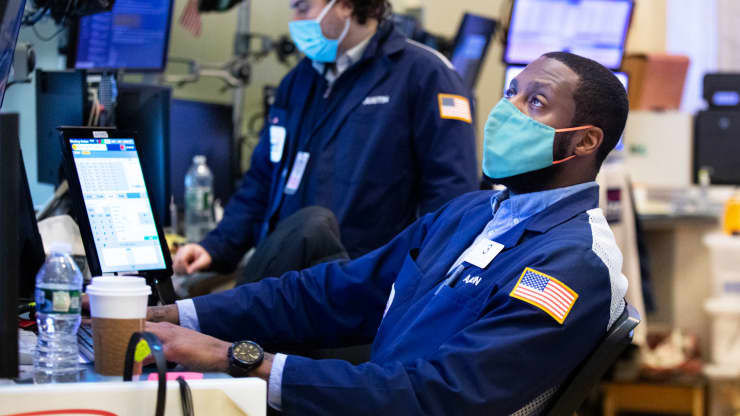
After January’s surprisingly strong jobs report, focus swings to consumer inflation in the week ahead and what it could mean for the Federal Reserve’s plan to raise interest rates.
Friday’s report of 467,000 jobs added in January confounded Wall Street economists, some of whom expected a negative number due to the impact of the omicron Covid variant on the workforce. The report was also stunning in other ways. Payrolls were also revised higher by 709,000 jobs in November and December, and wages grew at a hot 5.7% year-over-year pace in January.
“Everyone’s back to playing leap frog over each other to see how hawkish they can get about what the Fed’s going to do, when the Fed probably doesn’t even know itself,” said Art Hogan, chief market strategist at National Securities. Traders in the futures market began to price in six interest rate hikes for this year, while many economists predict four or five.
The consumer price index is reported Thursday, and the University of Michigan’s consumer sentiment survey is released Friday. There are also dozens of earnings in the week ahead, including pharmaceutical names Pfizer and Amgen. Walt Disney reports as do consumer staples like Coca-Cola, PepsiCo and Kellogg.
“We may get some sequential improvement in inflation readings. You start looking at the CPI on a month over month basis… there may be movement in the right direction,” said Hogan. He said headline inflation is expected to rise by 0.4%, down from 0.5% in December. But that would still be a hot 7.2% year-over-year reading.
“Maybe movement in inflation in the right direction would be revelatory. I think it might take a bit out of some of the hawkish tone the street has,” he said.
Despite a sharp jump in bond yields, stocks ended Friday with gains for the week. Large swings punctuated trading in the past week, and some individual names were highly volatile. Meta Platforms fell more than 26% in one day on earnings disappointment, and PayPal also lost nearly 25% in a single session after issuing weak guidance. Amazon jumped 13.5% Friday after its earnings.
Julian Emanuel, senior managing director and leader of the equity, derivatives and quantitative strategy team at Evercore ISI, said that type of volatility in individual names highlights the risks for investors in the top tech growth stocks that are among the largest names in the S&P 500.
“It’s extremely difficult for investors who have only known how to make money for 15 consecutive years by owning growth stocks to change how they view the world. The volatility we’ve seen around earnings in some of these names is not a surprise, but it’s exacerbated in an economy that is likely to grow north of 4%,” he said.
Emanuel expects cyclical and value stocks to perform better than growth names in an inflationary environment in which the central bank is raising interest rates.
The S&P 500 rose 1.5% in the past week, closing at 4,500, a key technical threshold. The Dow was up 1%, and the Nasdaq was up 2.4% for the week. The Nasdaq is now 13% below its all-time high.
Energy was the best sector for the week, up nearly 5%, followed by consumer discretionary stocks, up just under 4%. Financials were up 3.5%, and tech was up about 1%.
More volatility
Markets could remain volatile in the coming week. Yields saw a big move on hawkish comments from European and U.K. central bankers this past week. The move was extended even more, after the Friday jobs report.
“We expect continued volatility, which as we’ve all seen in individual stocks in the last week, can be both to the upside and the downside, all in the run up to the momentous March 15 FOMC meeting,” said Emanuel.
The U.S. 10-year yield, which influences mortgages and other loans, jumped as high as 1.93% Friday.
Luke Tilley, chief economist at Wilmington Trust, said he doesn’t expect the Federal Reserve to be as aggressive on interest rate hikes as the markets are forecasting. He also expects inflation to peak and begin to come down.
“As we get to March, April, May, we’re going to get to the point where the base effects bring the year-over-year numbers down,” he said.
Tilley expects a first hike of a quarter point in March with three others this year.




























